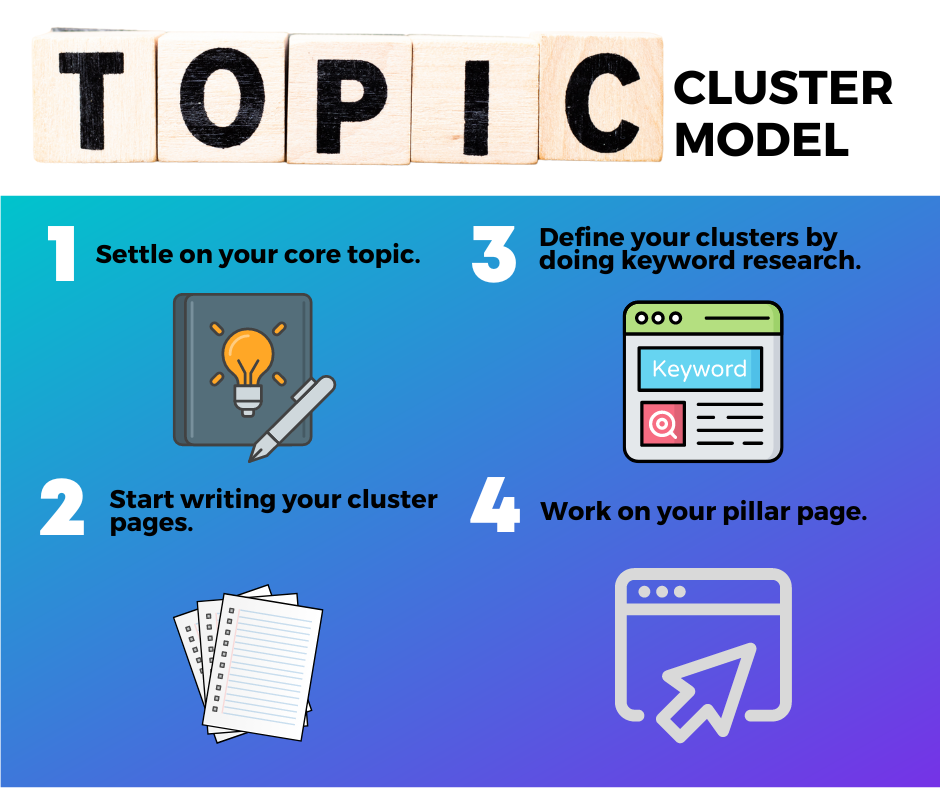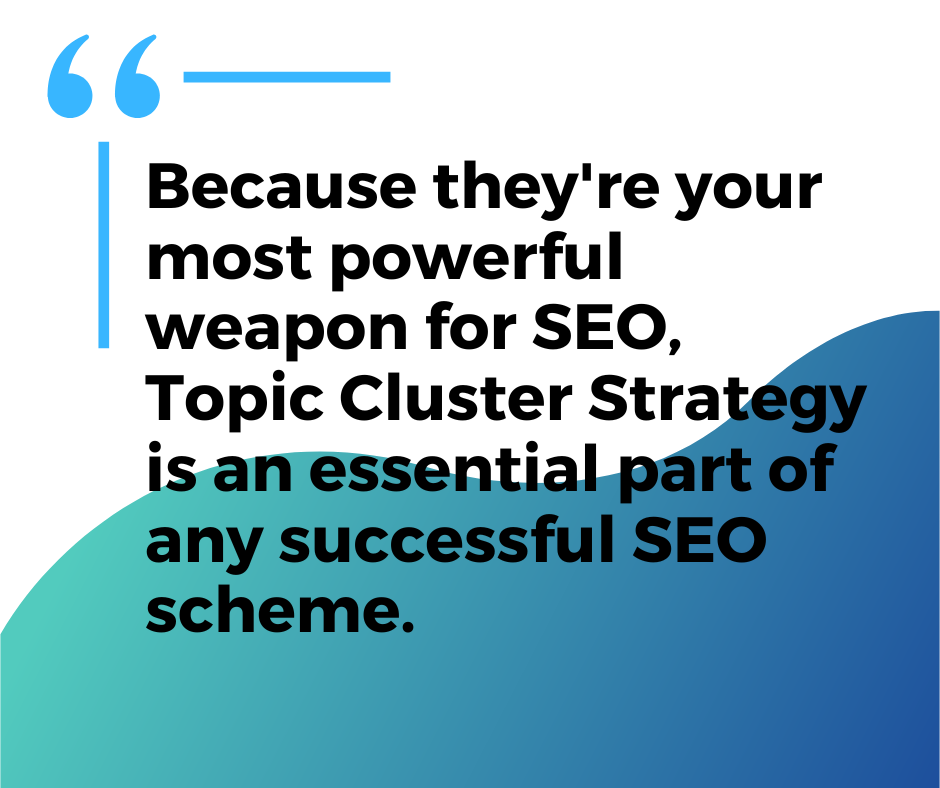Topic clusters - SEO’s major trend.

Google recently rolled out a new update to its algorithm. In this update, they've made changes to how they rank articles. They used to favour links, so favouring posts that aren't linked to would be good. But that doesn't mean you should stop writing and focus only on posting. You can still get traffic by focusing on what people actually care about. So, write about things that matter to them, not just something that your friends think matters. Be careful about keyword stuffing though - if you're trying to stuff keywords into every post, you'll end up getting penalised. Focus on quality rather than quantity.
The goal of these topics is to help Google better understand your business and show up when people are searching for similar things. If you’re an author, for instance, you might create and add articles about writing books, publishing them, book covers, etc. You might then add some pages about yourself, your background, and your experience writing.
This isn't just theoretical. A recent study showed that topic clusters actually affect SERPs. When people type a specific keyword into Google, the search engine shows them what other related topics they might also be interested in. For example, if someone types "wooden toys" into Google, the search results may include information about online wooden toys, eco-friendly toys for kids, montessori toys, and so on. And if someone types "buy toys online," the search results may include links to baby toy comparisons, wooden toys reviews, best toys for your babies tips, online toys news, and so on.
If you are new to topic clusters, we have listed some tips on how you can successfully create them. Check these out:
- Choose a keyword
Before choosing any keywords, first decide which one would be easiest to rank for. If you're going to pick an easier one, make sure you have enough demand for your content cluster to succeed.
- Find pages related to your topic.
Use Google to find out what keywords people are searching for around your product. Then, add those keywords into your title tag and meta description tags. You should also try to make sure you're including your keyword within the first 100 words (in order to capture social media sharing). Add related pages to your website that focus on these topics. Finally, check to see if any of the pages on your site contain errors. You can do this by checking each page for spelling and grammar mistakes. And lastly, remember to update your page periodically because every month old information starts to lose value.
- Add your own content.
Now that you've decided what kind of post you're going to write, it's time to get into the details. First, create an introduction that describes your topic cluster. Include brief descriptions of what each topic within your cluster covers, along with links to related posts.
- Repeat 2 & 3.
After writing out your intro pages, go through them again and add links back to the main page.
- Publish and optimise.
After you've created your topic clusters, post them on your site. Optimise each page as best you can by including title tags, meta descriptions and internal links.
- Check the results from time to time.
Keep track of how well your topic cluster performs over time. Use tools like Google Analytics to monitor traffic trends, and keep tabs on your ranking position.
- Add more topics.
Track which topics perform best and use tools like Google Analytics to see where your site ranks for certain keywords.
- Social media promotion!
Finally, promote your business cluster on social media. Post it on Facebook, Twitter and LinkedIn, and other platforms your target market uses. You can also post it on Reddit or Quoras, depending on the kind of content you're posting.
You can increase your organic reach by using images and infographics. They're highly shareable and lead people back to your site.
Moreover, we'll teach you everything you need to learn to become a successful business company who creates high quality topics for your SEO. Let's start by learning how to be ranked and read with a good topic cluster model.
Use the topic cluster model to get read and ranked.

To rank well on Google, you must provide valuable information and useful services. However, how can you determine what topics to cover? How can you figure out what people are searching about? There is no easy answer to these questions.
There is a way to do this, but it requires some advanced methods. You could create a topic cluster model called "the topic cluster approach" which would allow you to determine the most relevant topics for your business and then write content specifically targeted towards those topics.
In this article, we'll show you how to create good content for your business using these techniques.
More reasons to read further into this post - this will give you everything you need to start generating ideas, researching keywords, and building a library of content that gets results on Google.
Here, you'll learn:
• How to start writing for content marketing
- Using the topic cluster approach, you can build a library of content for topics that you haven't yet covered
- Identify topics based on keywords and data analysis
- Write blog articles that attract readers to click through so they learn more about your business
- How to publish content for different platforms so that you can drive traffic to different websites
- How to promote any kind of content (videos, images, text) through social media and other online channels
Let’s start!

What is the topic cluster model?
With the topic cluster method, the idea is to group words into clusters rather than keywords. This makes sense since there are many different ways of describing things, such as "how" to cook pasta, "what" is spaghetti, and "what" is chicken alfredo. Each of these three statements describes a very specific concept.
Settle on your core topic.
As soon as you've decided what topics you want to cover, it's time to create a pillar page for each one. You may choose to name these pages something like 'Product Features', 'Customer Reviews' and so on.
You don’t need to create every single piece of content related to the same exact topic. But you do need to decide upon one main topic that you want to talk about. Once you've done that, think about how you could divide up your content into different categories so that you can organise it effectively.
Define your clusters by doing keyword research.
Your three pillars, your understanding of them, and your readiness to create content tell you everything you need to know about where to go next.
Keyword research gives you an idea of what people are looking for when they're trying to learn something related to your subject matter. It then makes sense to write great content around these keywords so that you attract their attention.
Start writing your cluster pages.
Each cluster page can be used to focus on a single topic covered elsewhere on the website, or to provide additional context for an article. For example, a "Cluster Page" might include only a couple sentences summarising a blog post, while another could share information about a product sold in your store. A third could highlight a new feature of your service. In any case, cluster pages can be a great way to increase engagement around a specific theme.
Work on your pillar page.
With your collection of topics prepared, it's time to start writing the home page - the overall view on the overarching topic. A home page is like a summary of what the whole site is about. You want to give people a good idea ofthe your site is about without getting bogged down in too many specifics.
A pillar page is typically longer than a typical blog post but shorter than a book chapter. You want to provide enough information about the overall topic, while still providing examples to help readers understand the content.
Now that you have a general overview of your site, it's now time to go into greater detail about each of these topics. They're referred to as "subpages," and they should be short (~500 words).
You could use sub pages for just about anything, from teaching people about something new to explaining your site structure to clients who don't know, including:
- It is best used by using the product or service.
- Why the product exists
- What problems it helps solve
- Who uses it
- How it works
- Where to buy it
- What it costs
- How to get in touch with the company
- And anything else you think would make the reader interested in learning more.
Suggested Read: Why Should You Use Pillar Page in your SEO Strategy?
Now that we’ve got the basics of topic cluster covered, let’s find out how we can use it in SEO to get a better and more effective Content Marketing.
With the rise of social media platforms, the evolution of content marketing has been particularly visible in shifting away from traditional forms of advertising toward a strategy based on storytelling, which makes sense given the increasing awareness among consumers of the fact that they're being marketed to. It's not so much that brands are trying to sell things to people; instead, they're trying to convince consumers to buy into their brand stories.
Content Marketing means telling stories that help people understand who you are and why they should care about your brand. You need to create content that helps people understand who you are, why they should care about you, and what your product or service can offer them.
Content marketing also needs to adapt so that people don't need to type words into a search box anymore. Instead, they can simply speak their question aloud to get an answer from a digital assistant.
Asking questions helps people to understand the topic better, which lets them get more out of the content than if they were just reading an article. It also helps companies to reach potential clients through social media sites where they often spend their time.
Businesses can use popular topics (like sports, politics, health) to create audiences that trust them, which means they're more likely to follow their brands' updates.
To get the most out of these techniques, brands need to understand how to use them. Understanding topics enables you to identify opportunities within your audience and determine which areas of interest may exist.
After determining what type of content would appeal most to your target audience, think about writing articles, blog posts, infographics, videos (including online courses), podcasts, white papers, webinar presentations, and even mobile applications.
Content Clusters to Strengthen SEO - a Yes or No?
Definitely yes. Optimising your SEO is easier than ever thanks to advanced tools like Google’s Content Experiments. With these tools, you can test out various headlines, images, and descriptions on your site to see what works best to increase conversions. They also allow you to create multiple variants of pages that target different keywords and audience segments.
A clustering algorithm will help you organise your website so visitors are more likely to stay there for a long time. Content clusters allow readers to quickly find the information they're looking for without having to jump from page to page.
You would instead want to focus on creating content that focuses on the details of your products. The more focused your site's content is, the easier Google will be able to understand what your page has to offer.

Because they're your most powerful weapon for SEO, topic cluster strategy is an essential part of any successful SEO scheme.
Google utilises a number of signals to determine what sites are the most appropriate for a specific user. One of those signals includes topic clusters. Those are groups of related words, which Google thinks describes a certain subject matter. By typing an individual keyword into Google’s search box, users can get information about what they searched for. In addition to that, Google also takes into account the site’s location, how popular the site is, the popularity of keywords associated with the website, and the quality of backlinks pointing to the site.
Topic clusters are powerful because they're trusted by Google. They get an extra boost in their ranking from the fact that Google trusts them.
While topic clusters can help increase your organic traffic significantly, if you're not careful you could end up diluting your keywords. Let's take an example - let's say you wanted to rank for the term "best dog food" but you knew that none of your competitors were ranking for that specific keyword (since it doesn't exist). What would you do? Well, you'd probably create a cluster around that word and then try and get links pointing back to those pages so that Google would think that your site was relevant to the topic. However, because you've added another variation of that same keyword, you'll likely dilute your rankings.
You now have tons of different keywords, some of which might be relevant but not specific enough for "best spaghetti recipe," so they won't rank as well. However, if you start adding synonyms for "spaghetti" into your keyword list, you'll see them begin to rank better.
So when Google finds out that you're using too many words that aren't relevant to your keyword phrases, it thinks that you haven't done any real research on the topic, so it ignores your pages altogether.
Now, here's something interesting: even though you've added lots of keywords that don't actually relate to your page at all, Google still thinks that the content on that page isn't reliable enough to rank well for that phrase!
Topic clusters allow you to create websites for different topics. As long as there's enough content pertaining to each topic, they won't be afraid to place your site at the top of their search results.
The Takeaway

Clusters provide great value for your SEO, which means they can improve your web page's ranking in search results.
When using topical clusters, marketers often struggle with how to ensure that their clusters are actually delivering value to their audience.
If you need help in setting up and maintaining your topic clusters, our professional team of SEO specialists can show you how to choose topics, how to structure and measure the impact of your clusters. You'll learn about our recommendations for creating high-quality content within each cluster, how to evaluate whether your topic clusters are delivering value, and how it benefits your SEO and content marketing.
Feel free to get in touch with us anytime so we can schedule a free consultation.
Suggested Read: Importance of SEO Copywriting & Content Writing
FAQs
How does topic clustering benefit content marketing?
Topic clustering benefits content marketing by allowing you to create comprehensive and in-depth content around specific topics. By organising your content into clusters, you can thoroughly cover all aspects of a topic, providing valuable information to your audience. This not only helps establish your authority and expertise in the subject matter but also keeps your audience engaged and encourages them to explore more of your content.
Does topic clustering improve user experience?
Yes, topic clustering improves user experience by making it easier for visitors to navigate and find relevant information on your website. When your content is organised into clusters, users can follow a logical path from the main pillar page to the related subtopics, guiding them through a comprehensive exploration of the topic. This improves user satisfaction, reduces bounce rates, and increases the chances of users finding the information they need.
How does topic clustering increase organic website traffic?
Topic clustering increases organic website traffic by improving your website's visibility in search engine results. When search engines recognise the relevance and comprehensive nature of your content, they are more likely to display your website in search results for related queries. This drives organic traffic to your website from users who are actively searching for information on the specific topic you cover, increasing the chances of attracting qualified leads and potential customers.
Can topic clustering help with content promotion?
Yes, topic clustering can help with content promotion. When you have multiple pieces of content interlinked within a cluster, it becomes easier to promote the entire cluster as a valuable resource. By promoting the main pillar page, you can drive traffic and attention to all the subtopics within the cluster, maximising the exposure and reach of your content. This holistic approach to content promotion can generate more engagement, shares, and backlinks, further enhancing your SEO efforts.

